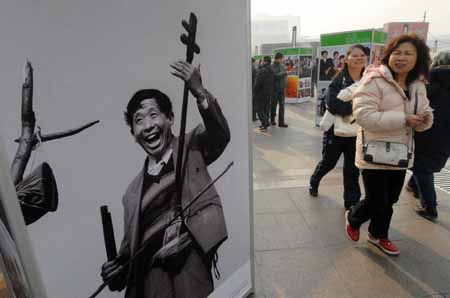A modern market economy, for all its inadequacies, has been providing increasing choices and opportunities for the world's largest working population.
In contrast, 30 years ago, many people had questions and even quite serious doubts. Conflicting reports about China were printed side by side in newspapers.
 |
| People walk past an old photo at an exhibition featuring China's 30 years' reform and opening-up at Wangfujing Street in Beijing, China, on Dec. 16, 2008. [Xinhua] |
Now, it would be instructive to recall some of the skeptical, if not cynical, comments that China once heard from overseas and compare them with reality.
Many of those comments are no longer heard. But at one time or another, they were being recycled at a high frequency. Maybe they should not be all forgotten, as occasionally revisiting them may help people better appreciate the uniqueness of the Chinese reform experience.
In the early 1980s, when reform was being urged by Deng and his colleagues, one standard remark according to the new line of the Chinese leadership was "neither donkey nor horse".
How could an economy which, up to that day, only featured centralized planning and control shift to incorporate market forces?
How could a society where nearly every wall on the street was painted with ideologically-charged slogans allow individuals to dream of material incentives?
How could a people with more than 80 percent of them still living in the countryside doing work not much different from 1,000 years earlier, pursue modernization?
By throwing together ideas borrowed from disparate systems, those people used to say, China could only become a strange combination of contradictions. There might even be a danger of the country continuing to be bogged down in endless internal conflicts.
On the surface, the commentators were certainly right. Through the initial decade or so, Chinese economists introduced a huge number of experimental projects - based on inspiration from the former Yugoslavia, Hungary, Scandinavia, the United States, Japan, and the so-called "little tigers" of Asia - Singapore, Hong Kong, South Korea and Taiwan.
Many of the experiments did not come to fruition and were merged with other experiments. Retrospectively speaking, it does not matter, actually, how they worked out - so long as they could meet one criterion, most concisely summarized by Deng, that "poverty is not socialism".
Or, socialism allows for no poverty. So all the efforts, not just economists' experiments, but all villages', all factories', and all citizens' attempts to seek the kind of mix and remix of economic inspirations that they felt comfortable with.